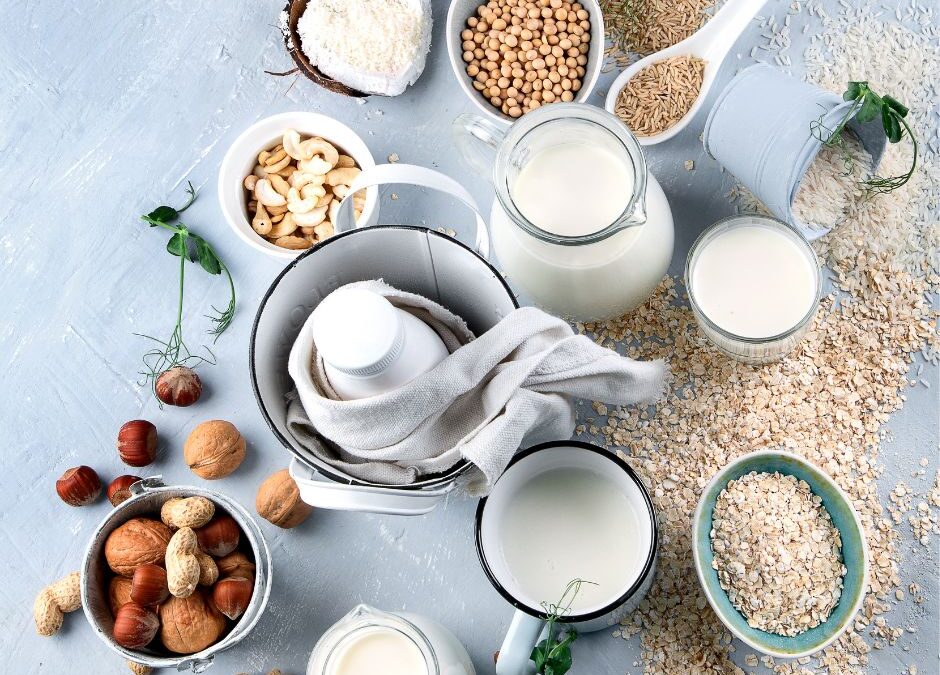Coffee is a basic human need for many people, and for some, it’s hard to imagine starting their day without a fresh latte. For a long time, dairy milk has been the default option for adding milk to your coffee, but as more people become health and environment conscious or choose to follow a plant-based lifestyle, milk alternatives are clearly gaining in popularity.
As we explore the world of milk alternatives, it’s important to consider their environmental footprint. One of the main advantages of plant-based milks is their significantly lower impact on the environment compared to traditional dairy milk. In this blog, we will unpack some of those advantages and take a look at the different kinds of plant-based milk.
Water Usage
Cow’s milk is notorious for its high-water footprint. Producing a litre of cow’s milk requires about 628 litres of water, mainly due to the water consumed by the cows and the irrigation needed for their feed crops. In contrast, plant-based milk generally has a lower water footprint. Almond milk, for example, requires considerably less water to produce, at only 371 litres. However, it’s worth noting that almond production is concentrated in regions that face water scarcity, such as California in the United States. By contrast, it only takes 28 litres of water to produce 1 litre of soy milk.
Land Use and Deforestation
Dairy farming requires significant land resources for grazing and growing animal food crops. 1 litre of cow’s milk requires almost 9 m2 of land. This often leads to deforestation and habitat loss. Plant-based milks generally have a smaller land footprint. For instance, soy milk has a relatively low land use impact (0.66 m2 per litre of milk). However, it’s important to ensure that the cultivation of plant-based milk ingredients is done sustainably, avoiding deforestation and protecting the biodiversity of our planet.
Greenhouse Gas Emissions
One of the biggest contributors to greenhouse gas emissions in the food industry is livestock agriculture, including dairy production. Cows emit methane, a potent greenhouse gas, during digestion and through their manure. Plant-based milks have a much lower carbon footprint, as they don’t involve livestock emissions. However, the environmental impact varies among different plant-based alternatives. Soy milk, for instance, has a lower carbon footprint than almond milk, which requires more energy-intensive farming practices.
The Alternatives
Not only do milk alternatives provide a vegan and lactose-free option, but they can also bring unique flavours and textures to your coffee, breakfast cereals and other applications. Let’s have a look at the currently available alternatives.
Soy Milk
Soy milk is definitely one of the most popular milk alternatives, and for good reason. It’s widely available, affordable, and has a neutral taste that works well in coffee. Soy milk also has a creamy texture that can provide a similar mouthfeel to dairy milk. Some people find that soy milk has a slightly beany aftertaste, but this can be easily masked by the flavour of the coffee. One of my personal favourites is Bonsoy.
Almond Milk
Almond milk has a light, nutty flavour that can add a subtle sweetness. It’s lower in calories than dairy milk, making it a great option for those watching their weight. However, almond milk is not as creamy as dairy milk, which may be a downside for some people. If you want a richer texture, try adding a bit of coconut cream or a splash of oat milk.
Oat Milk
Oat milk is a relatively new player in the milk alternative game, but it’s quickly gaining popularity. It has a mild, slightly sweet flavour and a creamy texture that can rival dairy milk. Oat milk is also versatile and can be used in a variety of coffee drinks, from lattes to cappuccinos. The only downside is that it can be a bit more expensive than other milk alternatives.
Hemp Milk
Hemp milk is a lesser-known milk alternative that is gaining popularity among health-conscious people. It has a nutty, earthy flavour that can complement the flavour of coffee well. Hemp milk is also high in omega-3 fatty acids, which can be beneficial for heart health. However, it has a thinner consistency than dairy milk, so it may not provide the creamy texture that some people prefer.
Cashew Milk
Cashew milk has a rich, creamy texture that can be a great substitute for dairy milk in coffee. It has a mild, nutty flavour that won’t overpower the taste of your coffee. Cashew milk is also low in calories, making it a great option for those trying to lose weight. However, it can be more expensive than some other milk alternatives, and isn’t available everywhere.
Rice Milk
Rice milk is another lesser-known milk alternative that is worth considering. It has a mild, slightly sweet flavour. Rice milk is also naturally low in fat, making it a great option for those watching their cholesterol levels. However, it’s thinner than dairy milk, so it may not provide the creamy texture that some people prefer.
Final Thoughts
As we strive to make more environmentally conscious choices, understanding the environmental footprint of our food intake becomes increasingly important. While traditional dairy milk has a substantial detrimental impact on the environment, plant-based milk alternatives offer a greener path. By opting for plant-based milks with lower water usage, land use and greenhouse gas emissions, you can definitely make a difference and start reducing your environmental footprint. So go ahead, explore the wide range of milk alternatives available and find the one that best suits your taste buds and aligns with your values.
Please let me know what you think, I would love to hear from you.
With Love,
Jimmy

